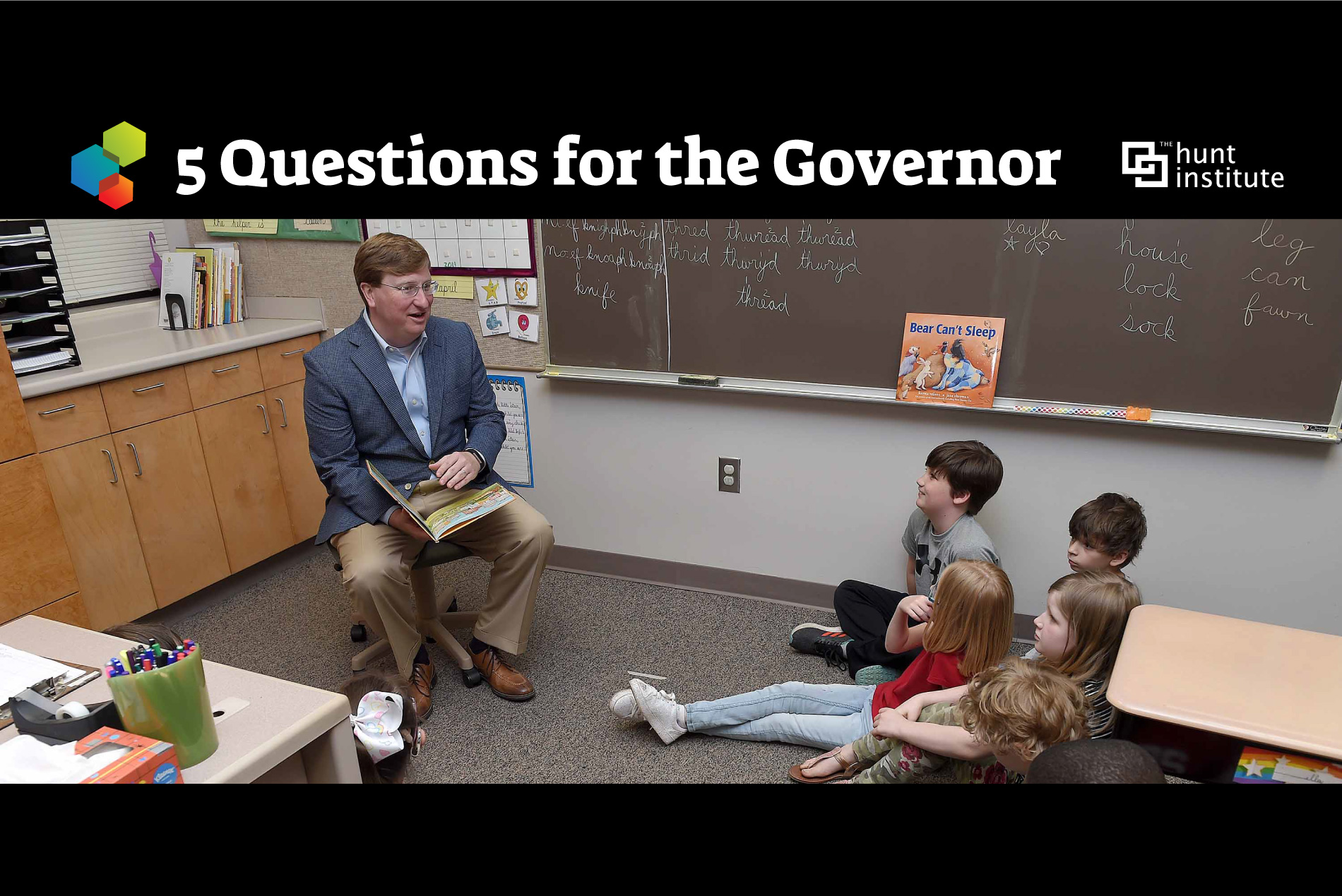Where do you go for the top news in Early Learning at the state level? Check out “5 Questions for the Governor,” where we’ll explore the top Early Learning challenges and successes in states across the nation. We’re thrilled to partner with The Hunt Institute on this series. Read them all.
1. As you reflect on Mississippi’s response to the pandemic, what makes you most proud of The Magnolia State?
Mississippians are resilient. In the face of tremendous danger, they have come together. We have been able to put politics aside and fight this virus as one. We’ve seen historic natural disasters and economic turmoil alongside the pandemic—and Mississippians have risen to the occasion. It is inspiring to me and my family every single day. We feel the prayers of Mississippians for us and know that they are putting that faith into action—lifting up their neighbors.
2. The Mississippi Legislature is in the final stages of passing legislation (SB 2286) designed to both expand access to the state’s prekindergarten program and better define requirements around the use of evidence-based curriculum models in the program. Why is it important to the administration to link the two?
The Early Learning Collaborative Act provides funding for high-quality pre-k programs. Those programs have specific requirements to ensure that the children enrolled receive a high-quality pre-k experience. Expanded access to high-quality programs means that more children will be ready for Kindergarten, thus allowing schools and districts opportunities to intervene earlier when deficiencies are identified. Expansion of the program would provide an opportunity to increase the number of children served within these programs.
 The requirements of this program include a curriculum that is evidence-based and proven to show outcomes for children. The Early Learning Collaborative programs use Opening the World of Learning (OWL), which has been shown in the Head Start Early Childhood Learning and Knowledge Center Curriculum Consumer Report to be a curriculum that met moderate evidence-base for child outcomes. OWL is the only curriculum reviewed that met this or any higher level.
The requirements of this program include a curriculum that is evidence-based and proven to show outcomes for children. The Early Learning Collaborative programs use Opening the World of Learning (OWL), which has been shown in the Head Start Early Childhood Learning and Knowledge Center Curriculum Consumer Report to be a curriculum that met moderate evidence-base for child outcomes. OWL is the only curriculum reviewed that met this or any higher level.
Linking high-quality curriculum and additional supports has been shown to help prepare children for Kindergarten. In the 2018-19 academic year, Mississippi’s State funded pre-k program through the Early Learning Collaborative Act was identified as one of four states that met all of the National Institute for Early Education Research’s (NIEER) ten quality benchmarks in their State of Preschool report.
3. Mississippi’s Childcare Crisis Assistance in Isolation Response Plan (CCAIR) was created to expand access to child care for essential workers on the front lines of the pandemic through non-traditional providers. Why was child care a critical consideration in the state’s response and what has the state learned in the process?
Seventy percent of Mississippi’s children under the age of six live in households where all available parents are in the labor force, so we made it an early priority to foster a reliable system of safe child care options: both to support children of essential workers, and to support the broader workforce to address the concurrent economic crisis.[1]
Mississippi has learned that despite many businesses closing out of necessity, child care services never ceased. Child care providers have continued operations despite fear of the unknown that has been so prevalent throughout this pandemic. Their role in supporting the economy, families and the social emotional development of young children cannot be underestimated. Mississippi’s CCAIR plan offers guidance based on information and best practices to ensure that those parents faced with the difficult reality of group child care during a nationwide pandemic could be assured of the safest possible environment for their children.
4. Mississippi has recently received national attention for its significant gains in elementary grade reading. What is the key to the state’s success and how does the administration plan to sustain and grow these positive outcomes?
The gains in elementary reading are a result of the comprehensive implementation of statewide policy, along with key strategies developed to support the State Board of Education’s strategic plan, especially goals 1, 3 and 4:
1. All Students Proficient and Showing Growth in All Assessed Areas
3. Every Child Has Access to a High-Quality Early Childhood Program and
4. Every School Has Effective Teachers and Leaders
 Clear goals assisted in the implementation of the Literacy-Based Promotion Act. The Mississippi Department of Education (MDE) used funding allocated from this legislation to develop a K-3 Professional Development System to build teachers’ understanding of the Science of Reading, delivered through the use of Language Essentials for Teachers of Reading and Spelling (LETRS).
Clear goals assisted in the implementation of the Literacy-Based Promotion Act. The Mississippi Department of Education (MDE) used funding allocated from this legislation to develop a K-3 Professional Development System to build teachers’ understanding of the Science of Reading, delivered through the use of Language Essentials for Teachers of Reading and Spelling (LETRS).
The MDE also deployed literacy coaching support to the schools with the greatest need.
In recent months, the MDE has created a virtual coaching model to support teachers in a digital learning environment, and the agency has continued to release resources to assist teachers and families. Mississippi’s Birth to Grade 12 Comprehensive Literacy Plan is currently under revision, as the MDE enhances support for middle grades teachers and teachers of students with disabilities.
5. You have raised children throughout a political career and now a pandemic. What are the biggest lessons of fatherhood that inform your work as governor?
Fatherhood is definitely humbling! And that has been my experience as Governor so far as well. You need the humility to change course and adapt. You need to be able to take criticism and listen. And you also need the clarity to do what is right, no matter what others say. As much as I enjoy and appreciate the professional work that I do, fatherhood will always be my greatest joy.
1Annie E. Casey Foundation (2020, August 11). Kids Count Data Center. www.datacenter.kidscount.org



